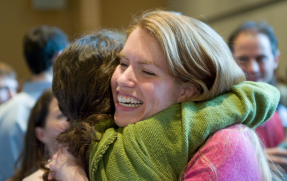
Career Days in their third year help lead to happy Match Day outcomes in their fourth year for UMMS School of Medicine students. Here, students celebrate receiving news of where they will be going to complete their residencies.
Aspiring physicians must travel a long educational road: four years to a bachelor’s degree, four years of undergraduate medical education and yet more years of study as a graduate medical student in a residency training program. And just like they began preparing for college while still in high school, and for medical school while still in college, medical students must start mapping out a plan for residency almost as soon as they arrive on campus.
To help them, the Office of Student Affairs sponsors a career guidance program, beginning in the fall of first year and capped by a three-part Career Days series to help third-year School of Medicine students make the transition from student to doctor.
The transition is a dramatic one. “Becoming interns brings a sudden, stunning jump in responsibility,” explained Associate Dean of Student Affairs Mai-Lan Rogoff, MD, associate professor of psychiatry and pediatrics. “The strategic goal of the career guidance program is to have fourth-year medical students land the residencies they are best suited for, and prepare them so that they are as comfortable as possible making that shift.”
The UMMS Career Days program comprises three sessions:
-
The first presentation covers the structure and function of the fourth year. Topics include selecting electives that are relevant to the desired residency specialty, and the residency application cycle.
-
Second is a full-day program focused on choosing a medical career, with an in-depth look at navigating the American Association of Medical Colleges’ Careers in Medicine website. Highlighting the day are speed-dating type sessions in which students meet in small groups with UMMS training directors or their delegates to learn more about specific fields and what is required to match into them. These representatives also answer questions about the best way to structure the fourth year of medical school to get into that residency and what life is like in those fields.
-
The final session, “Soup to Nuts,” covers practical information about the residency application process, including tips on writing the personal statement and strategies for interviewing.
This year’s first and second sessions took place in January and February and Soup to Nuts is scheduled for April 4.
“Each Career Day lets us focus, get direction from our teachers and bounce ideas off each other,” said third-year SOM student Seth Curtis. “The greatest progress I have made in deciding on a specialty has come right after a Career Day event, when a few of us grab a quick bite to eat together, which turns into hours of discussion on what we want to do with our lives and how to figure that out.”
”We tell students the most important thing that you do in medical school is learn to be a doctor. The second most important thing you do is figure out what kind of doctor you want to be,” said Michael Ennis, MD, associate professor of family medicine & community health, who also serves as assistant dean of student advising and co-director of the School of Medicine’s new learning communities.
Dr. Ennis described walking Career Day participants through an exercise called 4H Club, with the Hs standing for head, hand, heart and humor. “This is one of the various ways of looking at specialties,” he said. “Head is what is interesting to you, hands is what you like to do with your hands, heart is who you like spending time with, and humor is appreciation and enjoyment of your chosen field’s culture and unique sense of humor.”
“At Career Days we can focus our attention on the many approaches that people may take to choosing a specialty,” said third-year SOM student Megan Weeks. “Dr. Ennis prompted me to experience my third-year clerkships not just as a requirement for my degree, but as an opportunity to get the inside scoop on each specialty.”
With the advent of the new Learner-centered Integrated Curriculum, Career Days topics and issues will be further woven into the fabric of undergraduate medical education at UMMS. “In their new role, faculty mentors will work with students as teachers, career advisors and role models, addressing the full spectrum of career selection and development in a student-centered way throughout all four years,” said Ennis.
“They have a lot of choices to make, and a lot to do,” Dr. Rogoff said. “Our job is to help them get it all done.”
|
Third-year Career Days are now a distant memory for members of the SOM Class of 2011, as these fourth-year medical students eagerly await the results of all their efforts to date. Match Day 2011 will take place nationwide on Thursday, March 17, when, at noon, graduating medical students around the country will open the envelopes telling them where they will begin their careers as doctors. Look coverage related to Match Day 2011 on UMassMedNow beginning Monday, March 14. |
Related links:
Office of Student Affairs Career Day Program
Learning Communities mentors make a personal connection with students